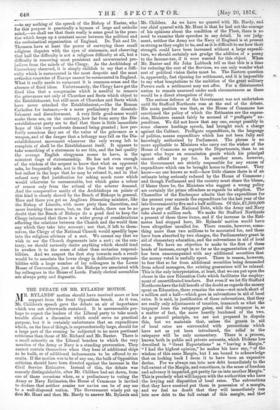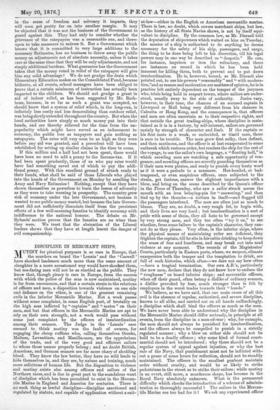THE DEBATE ON MR. RYLANDS' MOTION.
U. RYLANDS' motion should have received more or less
support from the front Opposition bench. As it was, Mr. Childers's speech gave the debate an air of importance which was not afterwards sustained. It is unreasonable per- haps to expect the leaders of the Liberal party to take much trouble about a discussion which could serve no practical purpose, but it is certainly unfortunate that an expenditure which, on the face of things, is unprecedentedly large, should for a large part of the evening be subjected to no more pertinent criticisms than those of Mr. Richard and Mr. Baxter. There is a small minority on the Liberal benches to which the very mention of the Army or Navy is a standing provocation. They cannot contain themselves when they hear of additional ships to be built, or of additional inducements to be offered to re- cruits. If the motion was to be of any use, the bulk of Opposition criticism should have been directed against the increase in the Civil Service Estimates. Instead of this, the debate was &lamely distinguishable, after Mr. Childers had sat down, from one of those occasions when, as a preliminary to voting the Army or Navy Estimates, the House of Commons is invited to declare that neither armies nor navies can be of any use to a well-disposed nation. The Government wisely put up -first Mr. Hunt and then Mr. Hardy to answer Mr. Rylands and
Mr. Childers. As we have no quarrel with Mr. Hardy, and our chief quarrel with Mr. Hunt is that he had not the courage of his opinions about the condition of the Fleet, there is no need to examine their speeches in any detail. In our judg- ment, neither the Army nor the Navy of England is at present as strong as they ought to be, and as it is difficult to see how their strength could have been increased without a large expendi- ture, we should certainly not grudge the addition of a penny to the Income-tax if it were wanted for this object. When Mr. Baxter and Sir John Lubbock tell us that this is a time for reducing the cost of the Services, we can only wonder what sort of political vision theirs must be. The Eastern question is, apparently, fast ripening for settlement, and it is impossible to say what temptations to the ambition of the great military Powers such a settlement may not offer. For a disinterested nation to remain unarmed under such circumstances as these would be a direct abnegation of duty.
The serious defence of the Government was not undertaken until Sir Stafford Northcote rose at the end of the debate.. His main position was that, as the House of Commons has sanctioned the policy of which the Estimates are the expres- sion, Ministers cannot fairly be accused of " profligate " ex- penditure. We did not know that any one, except possibly in some obscure hustings speech, had brought such a charge against the Cabinet. Profligate expenditure, in the language of politics, means expenditure which has not been fully and knowingly authorised by Parliament. The phrase is no more applicable to Ministers who carry out the wishes of the House of Commons as regards the Departments, than to an agent who buys on commission goods which his principal cannot afford to pay for. In another sense, however, the Government are strictly responsible for any excess of expenditure which can be brought home to Parliament. They know—no one knows so well—how little chance there is of an estimate being seriously reduced by the House of Commons ; and though Parliament and the country must share the blame, if blame there be, the Ministers who suggest a wrong policy are certainly the prime offenders as regards its adoption. The Chancellor of the Exchequer admits that the expenditure for the present year exceeds the expenditure for the last year of the late Government by five and a half millions. Of this, £1,300,000 goes to pay off the National Debt, while the Army and Navy take about a million each. We make Sir Stafford Northcote a present of these three items and if the increase in the Esti- mates had stopped here, Mr. Rylands' motion would have- been altogether uncalled for. There remain, however, some- thing more than two millions to be accounted for, and these have been absorbed by two charges, the Parliamentary grant in aid of elementary education, and the subventions in aid of local rates. We have no objection to make to the first of these heads of increase, except in so far as the augmentation of grant has been unaccompanied with any additional securities that the money voted is usefully spent. There is reason' however, to fear that so far from additional securities being demanded from school managers, the existing guarantees will be relaxed. This is the only interpretation at least, that we can put upon the clause in the new Education interpretation, which facilitates the employ- ment of uncertificated teachers. But even if we let Sir Stafford Northcote have the full benefit of the doubt as regards the money spent on Education, there remains the sum—not much short of a ninon and a half—which goes in subventions in aid of local rates. It is said, in justification of these subventions, that they are really only adjustments of taxation, inasmuch as what the taxpayer loses the ratepayer gains and the ratepayer , as
a matter of fact, the more heavily i
y burdened of the two. As a general principle, we are not prepared to dispute this, but we maintain that, unless the grants in aid of local rates are surrounded with precautions which have not as yet been introduced, the relief to the ratepayer will be only momentary. There is a process, known both in public and private accounts, which Dickens has described in "Great Expectations" as "leaving a Margin.' "I had the highest opinion," he makes his hero say, "of the wisdom of this same Margin, but I am bound to acknowledge that on looking back I deem it to have been an expensive device. For we always ran into new debt immediately to the full extent of the Margin, and sometimes, in the sense of freedom and solvency it imparted, got pretty far on into another Margin." This is precisely what will happen with the authorities who have the levying and disposition of local rates. The subventions that they have received put them in possession of a margin, and we feel no doubt that they will immediately run into new debt to the full extent of this margin, and that in the sense of freedom and solvency it imparts, they will soon get pretty far on into another margin. It may be objected that it was not the business of the Government to guard against this. They had only to consider whether the grievance of the ratepayers was a reasonable one, and there- upon to take measures to redress it. But a Government which knows that it is committed to very large additions to the necessary Estimates, has no business to throw away the public money on adjustments not of absolute necessity, unless it takes care at the same time that they will be only adjustments, and not simply additional burdens. What guarantee has the Government taken that the money voted in relief of the ratepayer will give him any solid advantage? We do not grudge the drain which Elementary Education makes on the Consolidated Fund,because hitherto, at all events, school managers have been obliged to trove that a certain minimum of instruction has actually been imparted to the children. We should not grudge a grant in aid of indoor relief, as has been suggested by Mr. Rath- bone, because, in so far as such a grant was accepted, we should know that a system of relief which, in the long-run, is infinitely less costly and less demoralising than outdoor relief, was being slowly extended throughout the country. But when the local authorities have simply so much money put into their hands, and are thereby relieved for the time from the un- popularity which might have served as an inducement to economy, the public lose as taxpayers and gain nothing as ratepayers. The rates will very soon be as high as they were before any aid was granted, and a precedent will have been established for setting up similar claims in the time to come.
If this million and a half had not been spent, there would have been no need to add a penny to the Income-tax. If it had been spent prudently, those of us who pay rates would have had something saved out of which to pay the addi- tional penny. With this excellent ground of attack ready to their hands, what shall be said of those Liberals who played into the hands of the Government on Monday by assailing the Army and Navy Estimates ? Nothing, except that they have shown themselves as powerless to learn the lesson of adversity as they were to take warning in prosperity. The country grew sick of economy under the late Government, not because it wanted to see public money wasted, but because the late Govern- ment did not sufficiently dissociate itself from the persistent efforts of a few well-meaning fanatics to identify economy with indifference to the national honour. The debate on Mr. Rylands' motion proves that the fanatics are no wiser than they were. We trust that the abstention of the Liberal leaders shows that they have at length learnt the danger of evil companionship.































 Previous page
Previous page